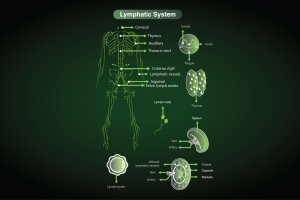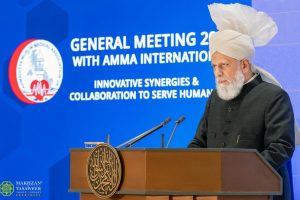
Fasih A. Rahman, Canada
The Holy Qur’an teaches that fasting is a means for attaining nearness to Allah Almighty, as stated in the following verse:
یٰۤاَیُّھَا الَّذِیۡنَ اٰمَنُوۡا کُتِبَ عَلَیۡکُمُ الصِّیَامُ کَمَا کُتِبَ عَلَی الَّذِیۡنَ مِنۡ قَبۡلِکُمۡ لَعَلَّکُمۡ تَتَّقُوۡنَ
‘Oh ye who believe! Fasting is prescribed for you, as it was prescribed for the people before you, so that you may become righteous.’ [1]
Fasting, particularly during the month of Ramadan, serves as a form of spiritual training that draws one towards righteousness and safeguards against evils. As Muslims, fasting is performed for the sake of God and in the following verse, Allah The Almighty states:
وَاَنۡ تَصُوۡمُوۡا خَیۡرٌ لَّکُمۡ اِنۡ کُنۡتُمۡ تَعۡلَمُوۡنَ
‘… and fasting is good for you, if you only knew.’ [2]
While it is understood that fasting encourages a person to attain many spiritual benefits, evidence from different scientific fields is emerging to show that fasting can provide many physical health benefits to different systems of the body. These may include the neurological, cardiovascular, and digestive systems. Moreover, research is beginning to show that fasting in combination with exercise may lead to improvements in physical fitness, metabolism, and possibly ageing. As nutritionists and health experts continue to uncover the different benefits of fasting, there is also an interesting study trying to understand what happens when a person undergoes fasting at the molecular and cellular level.
Fasting and the Role of Cellular Repair
Scientists are trying to uncover the mechanisms and processes that may contribute to the different physical effects of fasting. Understanding the ‘how’ can have important implications for disease prevention. A review from the New England Journal of Medicine reported that intermittent fasting – similar to fasting during the month of Ramadan, where food intake is restricted to a limited number of hours in the day – can lead to changes in insulin, growth hormones, and amino acid metabolism. These changes can activate certain cellular processes and can affect different organs systems and the body’s physiology.
One of these processes that is thought to be increased or accelerated in the body during fasting, is ‘autophagy’. Autophagy is a key cellular process that allows the body to recycle, remove degraded cellular components, and promote cellular renewal. During fasting, when the body is placed in a mild state of nutrient stress, the body’s cellular processes switch from a growth phase to a repair phase. Without the constant influx of food, in particular carbohydrates, insulin levels can go down during fasting, signalling the body to use stored-up energy sources. This change in energy utilisation, along with other signals could signal cells to enhance autophagy and go into a repair phase. For example, emerging research suggests that there could be crosstalk between insulin levels and autophagy such that, higher levels of insulin may inhibit autophagy and vice versa. Other metabolic changes during fasting may also signal the body to go into this repair phase and increase the levels of autophagy where dysfunctional or damaged cellular proteins are broken down.
Without the removal of these damaged components, they can accumulate and possibly cause additional damage to cells, which may lead to disease or accelerate ageing. The situation is analogous to if a person did not remove the garbage from their home for weeks, the garbage would release odours or harmful by-products that could make a person ill. In the same manner, the accumulation of damaged components is toxic to the cellular environment. As the processes of autophagy unfold, other processes in cells may also be activated such as those involved in DNA repair to initiate cell repair.
Origins of Discovery
The scientific origins about understanding the process of autophagy date back to the 1950s and 60s when Belgian scientist Christian de Duve discovered that a specific organelle (structures inside cells that perform a specific function) called a lysosome, was responsible for the breakdown of cellular material. De Duve discovered that lysosomes could ‘eat’ different material inside the cell and was awarded the Nobel Prize in Physiology or Medicine in 1974 for his discovery. However, his findings raised questions about the specific process that allowed cells to ‘eat’ material within the cell. Several decades later, a group of Japanese scientists led by Yoshinori Ohsumi identified the genes responsible for self-eating (autophagy means ‘self’ and ‘eating’ in Greek) in yeast. These findings resulted in the discovery of similar genes in humans and led to a better understanding of its molecular process. Subsequently, the role of autophagy or its disruption, was found to be associated with several human diseases, including certain cancers, metabolic conditions, and neurological conditions. Ohsumi was awarded the Nobel Prize in Physiology and Medicine in 2016 for his discovery.
Looking Ahead to Further Research
To date, most of the research examining the role of fasting on autophagy and cellular renewal has been conducted in lab settings using cell lines, and simpler models of yeast or mice. These models have allowed for close examination of how calorie restriction and fasting can influence the levels of autophagy occurring in different cells and under different situations. Human clinical trials examining the autophagy process in humans and the effects of fasting have been initiated as well. In such studies, levels of autophagy can be assessed by collecting tissue samples at different stages of a person’s fast. More research will need to be conducted in order to understand how duration, frequency, and other aspects of fasting may influence autophagy and eventual health outcomes.
As stated in the Holy Qur’an, fasting is indeed good for us, elucidating the biological mechanisms of how fasting can influence the physical body will be of ongoing interest. However, it is certain that following the guidance of the Holy Qur’an and the teachings of the Holy Prophet (sa), fasting during the month of Ramadan provides an opportunity to rejuvenate our spirituality and our minds. In time, research will tell how it may also rejuvenate the microscopic cellular components within our bodies.
About the Author: Fasih Ahmad Rahman is a PhD candidate within the Department of Kinesiology at the University of Waterloo, Canada. His research is focused on understanding the cellular processes involved in muscle development and regeneration.
ENDNOTES
[1] Holy Qur’an 2:184
[2] Holy Qur’an 2:185




Add Comment